#male psychology
Text
Advice on Intimacy (for Women)
Again, I will keep this tasteful and safe for work.
The biggest hang up most men have is being insecure about being manly enough, including in the bedroom. The way to get him over this, and form a deep emotional bond in the process, is this:
(A) Take the initiative and gently place him on his back, but do not start by kissing on the lips. Start lower, kissing his special places. The reason? This lets his mind relax and lets him know the pressure to put on a performance is gone. He can close his eyes for the moment, moving from negativity to positivity.
(B) With him still on his back, take him entirely, but gently.
(C) Talk to him sweetly, with words like, "Does that feel good?", and encourage him to express little coos of enjoyment, with words like, "That's right, baby (or whatever your terms of endearment are with him).
(D) Talk him through to the big moment, not in a "dirty" way, but softly and sweetly.
(E) Do not stop after the big moment. Keep gently kissing him all over, and keep saying soft, sweet words.
This way, you are in full control of him, but in the spirit of true love. He will not only need you physically, but emotionally, deeply, because you made him feel special, loved and deeply relaxed, free of all the anxious expectations to be macho. He will trust you.To make it full intimacy, emotional as well as physical:
(F) Talk to him about whatever he wants afterwards. Sometimes, just listening to what is on his mind without judgment is what he needs most- and, of course, cuddle.
Of course, do this only for the man of your life, but in truth, if a man does not appreciate this, he is not worthwhile anyway. Most men would be too embarrassed to describe these needs, but I am a man who likes women, and I think this approach to intimacy could even keep relationships together.
Bless you all, and peace:
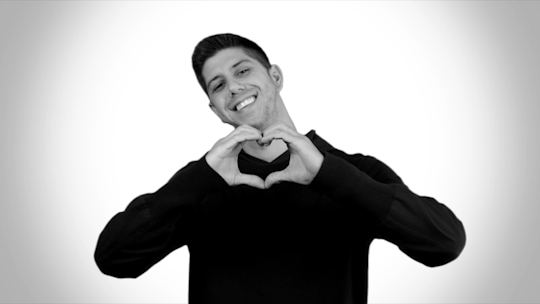
#intimacy#sex advice#sexuality#emotions#cuddling#love#romance#heart hands#what men want#treat him right#but only if he's the one#black and white#how to keep him#intimate#male psychology#deeper love#romantic#smile#trust#men and women
29 notes
·
View notes
Text
A feminist Searcher who reads definitions of fetishism in psychiatric encyclopedias and "studies" will find ejaculations of bias and self-contradictions everywhere. The authors of the entry on fetishism in the Encyclopedia of Aberrations and Psychiatric Handbook, for example, begin by discussing this as "a form of sexual deviation in which the person's sexual aim becomes attached to something that symbolizes that person's love-object" [emphases mine]. These sages go on to explain that the "something" may be an article of clothing or a nongenital (!) part of the body. It is only later in the article that we find their admission that the fetishistic "person" is male and the "love-object" female, when we read that: " . . . the fetishist is attempting to escape from women. When he cannot do so he compromises by depreciating them. . . . he can then consider [his mate] superfluous."
It would be a mistake for women searching for clues about fetishism to stop reading the article at this point, for we would be left with the knowledge that fetishists are male but might still assume that these constitute a perverted minority of males. Moving further into the maze of this analysis we come upon their admission that fetishism is so widespread in its implications that it includes acoustic stimulation, such as the pleasure obtained by listening to sexual stories. Immediately the processions of professional Peeping/Listening Toms appear before the feminist mind's eye, as we recall the parade of priestly, psychiatric, and ob/gyn Toms, whose main interests and concerns are sexual stories. By now we are ready to handle the concluding sentence of the article:
Fetishism is quite often a normal and necessary component of the sexual lives of all individuals [emphases mine].
A-mazing, we see not only that "individuals" means males, but that the "sexual deviation" described at the beginning of the article is considered "normal and necessary" for all males.
-Mary Daly, Gyn/Ecology
16 notes
·
View notes
Text
By: John Barry
Published: Sep 6, 2023
Do you ever hear a new concept, and suddenly realise that it has tapped into an important truth that had already been floating around on the hinterlands of your consciousness for some time? Well, 2019 saw the birth of one such idea: the concept of luxury beliefs (explained below), which was launched in the New York Post by Dr Rob Henderson, a former student of Yale and recent PhD graduate of Cambridge. The concept struck a chord with many people, and academia suddenly became very interested in this wunderkind Henderson. Unexpectedly, this interest hasn’t been reciprocated, leaving the academic world somewhat perplexed.
As an interviewer, it’s hard for me to say which is more interesting - the story of why Rob Henderson turned his back on contemporary academia, what he is doing next, or indeed what it is about his background that helped him recognise the phenomenon of luxury beliefs before anyone else did. Read on and decide for yourself.
--
John Barry (JB): You are interested in a range of topics in psychology, sociology, and anthropology. What drew you to studying psychology?
Rob Henderson (RH): I suppose I’ve always been curious about human nature and social behaviour. What got me started on the academic track was when I was enlisted in the military – over 10 years ago now – I found a copy of How the Mind Works by Steven Pinker at an airport on my way to a deployment in Al Udeid. I picked up this book because I thought the cover and title were interesting. Hmmm… how does the mind work? So I picked it up on a whim, read the book, found it fascinating, and that just got me started in reading more psychology books, watching psychology lectures on YouTube, and that led me to decide to study psychology more formally. I applied to Yale and studied Psychology as an undergrad there. And while I was studying psychology, I was also experiencing a shift in the social environment, in the social class backgrounds of the people who were around me, and so naturally I connected what I was studying and these anecdotal observations. This contributed to my decision to keep studying psychology and get as much education as I could, and that led me to apply for a PhD in Cambridge which I finished in December of 2022.
JB: Was there any particular thing in Pinker’s book that hooked you?
RH: He talks about the desire for social esteem, recognition, respect. How well regarded we are by others is not a material reward, it lives in the minds of other people. Pinker links this to evolutionary psychology and how important social belonging and acceptance were in the human ancestral environment, and that was something I had never thought about at that point in my life in a conscious explicit way.
JB: Is this topic related to your PhD?
RH: I was a research assistant in Paul Bloom’s lab. He’s a developmental psychologist who studies the origins of morality in babies and young children, and that became interesting to me. I read Jonathan Haidt’s book The Righteous Mind and read about moral foundations theory, so those interests led me to study this for my PhD. It’s unrelated to my public writing, but I do still study status. One of the studies we published a couple of years ago found that social anxiety, which is a proxy for preoccupation with status, is heavily correlated with how morally objectionable people rate various transgressions. One interpretation of this is the more concerned people are with their status, the more harshly they condemn moral wrongdoers.
JB: So this is something you published from your PhD?
RH: Yes, in the journal Scientific Reports. During my doctoral program, I led another set of studies as well, and co-authored a commentary and a chapter, but otherwise I don’t really have a strong interest to publish academic texts. It was an interesting experience just to see how peer review works and how academic publishing works, but I find writing for a broader audience more interesting and fulfilling. But it’s not that I don’t appreciate it – I spend a lot of time reading these papers and trying to pull out interesting tidbits or writing about them or sharing them online, but as far as formal academic papers go, there are probably not that many left in me.
JB: Sure. When you are writing for a wider audience it doesn’t mean that academics can’t read those articles too. Going back to your experiences in Yale and Cambridge, did they teach anything about male psychology?
RH: There is some teaching on sex differences, and there isn’t that much controversy about it there, but there isn’t that much specifically about men. My impression is that if you were to highlight challenges that men face, and controversies around male behaviour, well then it does have to be framed in one specific way. If you were to cast men as victims of anything in any way I think that would be treated very unseriously. That’s just my general impression. Sex differences are probably still ok to talk about, at least in academic environments among peers, but male psychology I don’t think is taken particularly seriously.
JB: It’s sad to see that even in the most prestigious universities. If they were to teach male psychology, what do you think would be the most important topics to cover?
RH: It’s interesting that a lot of this stuff is discussed in academic research. I wrote a piece a couple of years ago, for Bari Weiss’ outlet Common Sense (now The Free Press), and for that piece I did quite a bit of research on developmental psychology which found that boys appear to be more sensitive to environmental and parental inputs than girls - not that girls are unresponsive to these inputs – but boys who are raised in single parent homes, or particularly unstable or harsh environments, are much more likely to have detrimental health consequences, so later are more likely to experience poverty and unemployment, addiction, criminality and so on, and I think these things might be worth focusing on, especially as we continue to see more and more boys and young men lose interest in education and attaining gainful employment and rates of incarceration per capita appear to be rising too, especially among men across all ethnic groups in the lower socioeconomic strata. Men with low levels of education and income are more likely to be incarcerated than they were in decades past which to me indicates that this isn’t entirely about income. Poor people existed 50 years ago, but a poor man today is much more likely to be arrested than a poor man 50 years ago.
JB: Poor families are less likely to have the stability of a father in the home. Warren Farrell described prisons as ‘institutes of dad deprivation’, or something like that. It’s interesting that you say boys are more sensitive to environmental inputs, whereas the impression we get is that boys are tougher than girls. I wonder if boys are raised to be more tough because we know that if we don’t raise them to be tough they will be more sensitive than girls.
RH: I’ve never heard that hypothesis before, that’s really interesting. So we have this social pressure for men to be tough to counteract their intrinsic sensitivity… that seems plausible. Joyce Benenson has research showing that boys are immunologically more compromised than girls, more likely to be sick and to die from illness. This was a big surprise during the peak of the covid pandemic, that boys and men were more likely to contract and fall seriously ill and die from this illness. I’ve talked to some women about this and they were shocked to hear these statistics. In the popular imagination, men are sturdier, and though we may be physically stronger, in other ways perhaps men aren’t quite as naturally resilient as we thought.
JB: And men tend to fall in love more quickly than-
RH: They are more likely to say ‘l love you’, and say it first, which surprises a lot of people-
JB: Putting themselves in a vulnerable position, demonstrating vulnerability… and suicide? Maybe there is something to this idea of the vulnerability of men…
RH: Something that just came to mind John is that it may be that the most disagreeable, hostile, aggressive and resilient people are men, but that’s just the fatter tail in the right side of the distribution, but these men become the mental model with which we compare everyone else, so we think that men in general behave that way, whereas in fact we are thinking of only the top 5% or 1% of men who act in that way, whereas most men aren’t like that.
JB: From a psychological point of view, sometimes the most aggressive men are fending off people who might hurt them, because they may have experienced severe hurt or abuse in their past. I think sometimes the idea of ‘fragile masculinity’ is just used to sneer at men, but there is something to the idea that sometimes men who are broken have to put themselves back together in a way that is harder to break again in the future. But it might be a very abrasive persona that they adopt.
RH: There was a great memoir a while back by Nora Vincent called Self Made Man. This was about a woman successfully impersonating a man for a year, and one of the things that surprised her was, she describes men as carrying this armour around them that signals strength and toughness to the world because they know that if they appear weak or vulnerable, other men will sense that and take advantage. So this was something that she had to learn to cultivate herself, because if she dressed as a man but expressed vulnerability and tenderness then other men would immediately sniff this out and sense how exploitable she – or in this sense he – was. And I found that insightful, something that only a woman who is impersonating a man would pick up on. I don’t think a man would necessarily understand in an explicit, verbalized way what they are doing when they project toughness.
JB: The armour is ok but dropping the armour is necessary sometimes too. My colleague Martin Seager described how in group therapy with men the dynamic is different that in mixed sex groups because male groups will have a lot of joking around, or banter as we call it here. But quite quicky the dynamic will go from banter to sharing serious experiences and comforting each other, and just as quickly again the dynamic can shift back again to banter. Getting back to universities teaching male psychology, this is the kind of thing that might be interesting, or on clinical training courses at least. But I don’t think that happens. Do you think there is enough diversity of thought on campus?
RH: No. There isn’t enough diversity of thought, and it seems to be shrinking. One of the reasons I decided to come to Cambridge was because of what was happening in America, with political correctness, and professors being targeted, with students and faculty uniting to try to fire academics. I saw it first hand at Yale, and at Cambridge I’ve seen it as well. Famously there was the case of Jordan Peterson having his invitation revoked. I’ve also seen behind the scenes to examples of people who were less well known academics who have been fired or had offers rescinded for basically disagreeing, for their ideas. Not for anything they had done or any behaviour they directed at any individual, but just ideas that they have expressed, either in writing or in podcasts etc. and people took issue with it. Generally my heuristic is that for every example we hear of where someone gets fired, there are probably 10 others that we don’t hear about, of people who aren’t famous or well known, who are just quietly let go. One reason I decided to relinquish continuing a traditional academic career path, and why I decided to get involved with the University of Austin, which is this new university – UATX – which is launching in Texas, because they made explicit their commitment to freedom of expression and academic inquiry, which is what I hoped that all universities would be like when I first matriculated to Yale. But instead, the place that people feel least free to speak their minds are oftentimes university, which I found absolutely stunning.
JB: Tell me more about the University of Austin. Is it a physical university?
RH: It’s in the process of being built. At the moment we are running summer programmes. I believe the inaugural date for the first official cohort of undergraduates is in the fall of 2024 and it will be a physical university. The aim is to be a traditional liberal arts education where students can feel free to explore novel ideas. There are a lot of high profile people involved, for example Pano Kanelos the former president of St John’s College in Annapolis, he’s now the president of UATX, Bari Weiss, Dorian Abbot from the University of Chicago, Glenn Loury from Brown, Peter Boghossian and many other notable academics. It’s still the early stages but I’m hoping we are building what a university should be.
JB: Is this the beginning of a trend?
RH: I hope so. Not that UATX should be cloned, but I hope more universities attempt to reform higher ed.
JB: I hope so too. There are some really questionable ideas doing the rounds in Social Sciences departments these days, such as negative views of masculinity, and ideas about male privilege and patriarchy theory. You came up with the idea of ‘luxury beliefs’ a few years ago. Would you say that ideas like patriarchy theory are examples of ‘luxury beliefs’?
RH: So luxury beliefs I’ve defined as ideas and opinions that confer status on the upper classes while often inflicting costs on the lower classes. The idea of patriarchy might be a luxury belief. A lot of things fall under the umbrella of patriarchy, for example a lot of people think marriage and monogamy are an outgrowth of patriarchy. A lot of highly educated and affluent people will publicly denigrate marriage, patriarchy, masculinity… all these things in their mind falls into the same broad category. And yet these people are the most likely to get married, the least likely to get divorced, they would be the last people to consider raising their kids without a father or strong male role model in their lives. And yet by broadcasting this belief and spreading it they have inadvertently created a situation where lower income people are less likely to get married – there’s more single mothers, single parents, more kids growing up fatherless. What’s interesting is that if you publicly discuss the challenges of kids who grow up fatherless, a lot of the anti-patriarchy people will cast an eye of suspicion upon you, like ‘Why would this be a problem?’, ‘What’s so special about fathers?’, ‘Maybe it’s a good thing’, ‘The real problem is that single mothers don’t have enough financial support, and if they just had enough money… a stack of cash can replace a father’, and all of this I think is associated with an anti-patriarchy ideology, and yes it could be considered a luxury belief. It’s interesting to think about it: if you asked on a scale of one to ten ‘Are men a problem?’ higher educated people and more affluent people would probably score on the higher end of that scale.
JB: We are both fans of The Sopranos (I co-authored an article about the relevance to men in therapy). Almost none of the characters are likable in the Sopranos, so why is it so popular?
RH: It’s like with any good story, when they take you into someone’s world, into their inner life, then someone who you wouldn’t ordinally sympathise with, you suddenly adopt their perspective and understand where they are coming from. The therapy sessions between Tony Soprano and Dr Melphi was an amazing device, so you could get a glimpse into his psyche. There were flashbacks to his severely unstable and dysfunctional childhood, with his father who was a gangster and a murderer and his mother who was clearly mentally unwell. So he was immersed in chaos and criminality from a very young age. And the show does a great job of depicting Tony outside of his criminal enterprise. You see him as a husband, a father, a regular guy going about his day wrestling with a lot of the same questions that everyone else wrestles with. So they are showing the humanity inside these characters.
JB: In a way you are saying that by walking in their shoes we are able to empathise with these characters. In male psychology we use the term ‘empathy gap’ and in The Sopranos there are a couple of times where Tony Soprano is the victim of domestic violence-
RH: I saw that in your piece. It’s so funny I’m so blind to it, that when you wrote that… I remember when I watched it about two years ago during the lockdown and it didn’t even occur to me that it was domestic violence when women are slapping him or throwing things at him. I just thought ‘Oh it’s Tony, it’s fine. He’s a man.’
JB: Exactly!
RH: David Chase [screenwriter of The Sopranos] was walking a fine line. I think for the first three or four seasons at least he was sort of on Tony’s side, so it was easy for the audience to forget who this guy really is, and what he is capable of and what he’s done. But especially when you get to the final couple of seasons, like when Tony murders his nephew, and he orders the death of Adrianna, he’s just getting more and more morally compromised. Finally towards the end you start to understand. There’s a great book on evil by Roy Baumeister called Evil: Inside Human Cruelty and Violence where he points out that if you want to understand evil, you have to suspend your judgement. You have to be willing to see things from the eyes of the perpetrator. But it’s even more important to remember that these people are evil and the rest of society needs to be protected from them. So it’s a tricky balance. They are still responsible for their acts even if you understand where they are coming from.
JB: I’ve sometimes said that one of the biggest challenges to forensic psychology is to be able to empathise with people who might have committed horrible crimes. I suspect some people are reluctant to because of the fear that if they empathise, they will then start to sympathise-
RH: And they don’t want to justify what the criminal has done. Yes. I think if someone made a mini-series about Hitler or Stalin or Mao, that might be very uncomfortable for a lot of people! Any villain, if you make them the main character, they just become an anti-hero.
JB: An interesting phenomenon. Maybe in a related way, military history is full of heroes, but we usually think of the military is being a cause of psychological damage to men, through combat stress or bullying etc. One of the surprising things I found when writing Perspectives in Male Psychology was finding out that the military could be good for mental health. How much was this your experience of the US Air Force?
RH: One thing is a selection effect. The military in the past century has perfected their screening method – standardised tests of physical health – and maybe mental health to a degree – and proxies for intelligence, and then multiple appointments, and then basic military training which selects for people who are fairly mentally adjusted. There are lots of hoops - it’s a long and extremely intense experience especially for 17 or 18 year olds. Lots of people don’t make it – they don’t make it through all of the hoops. So up front a lot of people are screened out. And then the experience of the military is unique. They are very good at creating communities out of strangers. They have learned, maybe through trial and error over the course of centuries, how to take a bunch of random men from all parts of the world or country, and make them feel like family members, getting them to feel connected. Even things like the uniform – immediately your identity is stripped. In basic training they shave your head, you are put in uniform, everyone is called by their last name, so immediately you feel like you are part of this group. So there is community, comradery, structure, predictability. When you are deployed and in the midst of severe conflict, there can be unpredictability introduced but day to day you know what the rules are, what’s expected of you, how to advance in the rank structure, who you are responsible for, who your superiors are, how to behave. All of these explicit guidelines make life easier, especially for young men. In the outside world there are all of these questions like ‘Who am I? What am I doing?’ All of these anxieties around identity. But in the military your identity is very clear. Success is clearly defined. You get regular feedback, performance reports. For a lot of guys it’s like a video game – success and failure are very clearly defined.
JB: Could it work as therapy? Could you take Christopher Moltisanti (The Sopranos) into the military and help him?
RH: He has a severe temper problem. I just don’t know if he could handle subjugating himself to the military. I had a cousin who tried to join the marines. At basic training he punched one of the recruits and then he tried to fight a drill instructor. They kicked him out. I think that might happen to Chris too. But maybe AJ (the son of Tony Soprano) could have been ok? Or maybe the young Tony Soprano. He was a high school athlete, with a high IQ, it could have worked for him, before he got too caught up in a life of crime.
JB: You joined the Air Force at age 17. What motivated you to join, and did it prepare you for the life you have led since?
RH: I joined because I grew up in foster homes and I wanted to flee as soon as I could to escape the complete chaos and disorder around me. My friends had similar upbringings. I barely passed high school, just getting into a lot of trouble, and I knew that I wasn’t on a good track, and I wasn’t really ready for college. I wouldn’t have been a good student anyway at that age, I was just so undisciplined and unfocused. So the military was a very appealing option because I knew that it would immediately get me out of the environment I was in, at that time in Red Bluff, California. I knew it would immediately get me out of there, put me on a completely different track, put me around new people, give me a different kind of structure. There were also older adults too. So one of my teachers was in the Air Force – he suggested it. My best friend’s dad also recommended I join. So these two older men that I respected, both of them could see there was some latent potential, and once I got there, all of the things I mentioned before – the discipline, respect, comradery, setting goals, building good habits – all of those things really helped me.
The other thing that I think people focus less on with the benefits of the military is… well you are well aware of the ‘young male syndrome’? 18, 19, 20 are the most volatile years of a young man’s life, most likely to commit crimes, acts of aggression, impulse, drugs, speeding, but because the military has such an overpowering structure where every aspect of your life is controlled, you can’t make mistakes. I mean you can, but they make it very clear that if you fail a drug test for example, you go to military prison. You can’t get away with anything. So it presses fast forward on the most volatile phase of your life, and then by the time you finish your enlistment in your early 20s, you have cooled off, you’ve matured, you are a bit less impulsive and full of anger and hormones. So even if you didn’t learn any lessons at all, it was a period of your life that you couldn’t screw up too badly.
JB: That’s a very good point. You mentioned ‘young male syndrome’, I read recently that young people are less likely to take risks now than youngsters in the past.
RH: They are still likely to be their most volatile years. I recently wrote an essay in The Free Press about why teenagers aren’t driving any more, and there are so many factors. As Jean Twenge says “The party’s on Instagram and Snapchat now”. I think social media is more appealing to girls, but video games are appealing to boys, as outlets for aggression and accomplishment. You can get your 5 buddies from class and go on a raid on World of Warcraft. Well, men used to go on raids, actual physical raids, which aren’t a good thing to do, but boys get excited about it still, online. And that’s how they spend their Friday nights instead of going out and getting drunk and speeding on the highway. Maybe that’s ok, but taking some risks, testing your limits, in some ways is actually a good thing. I’m curious as to where this is going to go, when you have this generation who are afraid or unwilling to take risks.
JB: I wonder how this generation would fare if a war broke out, not on Xbox, but in reality.
RH: The Pentagon said that 78% of adults wouldn’t qualify for enlisting in the military. That’s 8 out of 10 men aged 17 to 24, primarily due to issues of obesity, lack of education, and criminal records, tattoos, mental health issues - if you have repeated episodes of depression and anxiety. Jonathan Haidt has shown how anxiety and depression are increasing in teenagers and young adults in the last 15 years or so, which is alarming. Maybe some of these issues are intertwined: if you are never leaving your house, if you are always living your life online, this is contributing to issues of depression and anxiety to some extent.
JB: If you were to give advice to a guy aged 17 coming from a similar background as yourself who was considering options for their future…?
RH: My advice would be different to someone from a straight-A’s background, but a background similar to me… Look at your friends and say ask yourself if this is the kind of person you want to be like in five years time, or 10 years. Or look at people around you who are a little bit older. I worked at a restaurant when I was a teenager and I saw guys in their early 20s, or mid 20s, still working there, not making very much money. The highlight of their week was getting paid on Friday and drinking away the weekend, smoking, doing drugs, partying, it just didn’t seem like the kind of person I wanted to be when I was 25 years old. So consider getting a different peer group, whether that’s joining the military, getting involved in sports, volunteering… find a different crew to hang out with.
JB: Good advice. I know you have started Substack this year, and are with the University of Austin. Are there any other new projects coming up?
RH: I’m putting the final touches to my book. I recently did a book cover reveal on my newsletter and on Twitter/X and will say more about the publication date soon. The book elaborates on some of the things we have talked about, using my life and the lives of my childhood friends as a framework for understand what is going on with young men today, the ‘lost boys’ phenomenon that’s going on in the US and western countries in general. So most of my time is invested in my book and my Substack.
--
Final thoughts
There is no doubt that academia needs more people like Dr Rob Henderson who can bring a fresh perspective to a culture that in recent years has started going stale. Some people say it’s a shame that he has left academia, but they are missing the point: he is helping rediscover – or reinvent - academia, and all of us left frozen on the deck need to take notice. A bit like the boy in the story of The Emperor’s New Clothes, Rob Henderson has seen right through the facade of highbrow elitism and the ivory-tower illusion of today’s academic world. His story is without doubt an interesting one, and definitely one to follow in the coming years.
#Rob Henderson#luxury beliefs#luxury goods#luxury items#status symbols#status seeking#social status#social standing#human psychology#psychology#male psychology#male vulnerability#domestic violence#domestic abuse#male victims of domestic violence#male victims of domestic abuse#violent women#religion is a mental illness#long post
9 notes
·
View notes
Text
7 notes
·
View notes
Text
The difference in sexiness between JM and JK is this. JM has a sexy stage persona that is aggressive, provocative, and bold. However, in real life he is quiet, coy, and cute. Honestly, I don’t think he’s truly an alpha. His insecurities seem to make him defensive so he appears dominant. His true self isn’t.
JK on the other hand is casually sexy. He appears aloof onstage. His sexiness is unpracticed and sometimes surprising. Off stage he is more assertive. JK is the alpha. Hate me if you will, but who is the one member that doesn’t listen. Who is the ONE member that never focuses. JK. Alpha males, aren’t necessarily vocal. In fact, the most effective ones aren’t. They are quietly powerful. They have what is called an “aggressive stare.” Their eyes and body language are LOUD. JK is constantly yelling, rebelling, and sticking the middle finger with his eyes and body language. This quiet dominance is sexy. Insecure men project with loud yelling and threats. Secure ones quietly wait, or will walk away. JK is the alpha. I standby that.
15 notes
·
View notes
Text
Edvard's Supernatural Guide: 2x02 Everybody Loves a Clown
Supernatural’s twenty fourth episode is another one which I remembered dimly from my first watch between Christmas and New Year 2008. Dean and Sam walking along the road after ditching the car, the killer clown, and even Harvelle’s Roadhouse and the carnival were all familiar when I rejoined the show in 2015. What I did not remember, however, was how insufferable Sam is in this episode. I never cared at all for Sam even in 2008, but my indifference turned to hostility with this episode in 2015. It was only the second episode I watched as I got back into the show in London, but that was all it took for me to want to reach through the screen and slap Sam in the face with a fish. Things have only got worse in the seven years since, but beginnings are usually a prudent place to begin, ergo...
youtube
2x02 Everybody Loves a Clown begins at a carnival in Medford, Wisconsin (the same state 1x03 Dead in the Water and 1x18 Something Wicked were set in, and just across the river from Stillwater, Minnesota, where Donna lives and works. People who care about Swedish literature might also recognise Stillwater from The Emigrants series). The cold open begins with a red balloon bursting in front of the camera, and then a few shots of performers and clowns. It was not until rewatching this episode last night that I realised the very obvious reference to Stephen Kings IT which features red balloons associated with a killer clown prominently.
youtube
Of course, the ’clown’ in IT is not a clown at all, but an entity from the primordial chaos (The Prim) which existed before the universe who can adopt the disguise of a clown to lure in prey. Its true form is beyond our human capacity to perceive and understand, but its closest representative is a giant spider (almost definitely inspired by Ungoliantë and Shelob from Tolkien’s work). If we were to see its real form, we would be driven mad by it (in case you missed it, Stephen King is indeed a fan of Lovecraft. As was Tolkien, funnily enough). This is not especially relevant to this episode of Supernatural, but what is is the trauma It inflicted on the protagonists in the 1950s when they were children (I believe the years were changed in the recent remake with the Bill Skarsgård brother as Pennywise, but in the original novel from 1986 the adults are in the 1980s and the children in the 1950s).
The relevance I see IT having with this episode of Supernatural is both cosmetic but also thematic. Childhood trauma plays a significant role in IT, so much so that one of the adults dies by suicide rather than go back to Derry to face It. In the cold open of 2x02, a monster in clown form kills a child’s parents in front of her.
Not the most important or necessary reference to Stephen King we could have had, but let me repeat: a child sees her parents killed in front of her in the episode following John’s death in 2x01 In My Time of Dying. As if to drive this point home, the title card is immediately followed by John’s funeral pyre. As with the connection between Dean and Francis Dolarhyde/The Great Red Dragon I discussed in my analysis of 1x06 Skin, the show has made a connection between Dean, Sam, and the protagonists in IT who are dealing with fear and mental wounds left by experiences with monsters in childhood. I read the novel a decade ago when I could still read 1,400 pages in less than a month, but it still took me all this time to make the link.
The clown in this episode is not a clown at all, but rather a demon from India. Had Sam not told the viewer the rakshasa was Indian, I would have had no idea whatsoever because it had no Indian aesthetics at all. Even the man playing the rakshasa was white-skinned (though if American carnies are anything like their British and Irish peers, there is a chance a man looking like him had some Roma ancestry not too long ago). Episode 1x11 Scarecrow also suffered the same problem with its ’Scandinavian’ deity who had no Scandinavian aesthetics at all, but could instead have been anything from any mythos or any part of the world. Even though the townsfolk were supposed to be descendants of Scandinavian immigrants, there was not a single Dannebrog, Dalahäst, or Marius jumper to be seen. It really was to the episode’s detriment that the Indian vibes were conspicuous by their absence.
Also to the shows detriment was that it did not explore the nature of how the rakshasa lures in children in order to get to their parents. I eventually came to the conclusion that it must be enacting some variety of mind-control or subconscious suggestion on the children. When the girl is lying in bed, she is roused by a faint noise from outside which was barely audible. If we compare this to the girl in the cold open of 1x18 Something Wicked who filled her knickers with shepherd’s pie when she heard the shtriga outside at night, it appears more is going on than meets the eye. I had to come to this conclusion because no child is so stupid as to open the door to a homeless-looking clown at god knows what time of the night. Surely not.
Something Paula R. Stiles raises in her own analysis of this episode is the fact that Dean makes friends with the monster before he realises it is a monster. He will go on to do the same in 2x03 Bloodlust, and it must be alienating and deeply unsettling for him to befriend and form bonds with people who turn out to be monsters. What does that say about him? See above RE: Francis Dolarhyde.
My own view of that is Dean definitely has the potential to be a terrible person. A wish I had for the show was that Dean become the villain at some point, and by Dean I do not mean Dean posessed by an angel or Dean as a demon, but just normal Dean. People are not good because they are born good: they are good because they choose to be good. And vice versa. So what if Dean had chosen at some point to give in to the demons of his worse nature, perhaps in order to avoid dealing with his trauma and accepting that he was the victim of other people’s horrendous actions.
Dean is shown throughout the show having relationships of various kinds with monsters, demons, and ’bad’ people. This ’darkness’ is a part of him, and for years I hoped he would be allowed to release it and eventually be forced to fight against it. For those of you who have watched Buffy, this sounds a lot like Faith. Dean is both the Buffy and the Faith of Supernatural, but not for the first time and most definitely not for the last I am forced to sigh and say: Such potential, Supernatural. Such potential.
Also interesting is the fact that the rakshasa is very keen on not hitting Dean with its throwing knives, even when it has a clear shot. It also appears very keen on making sure Dean sees it gank Sam. Other than that, I have little to say about the rakshasa, but the way Dean and Sam worked together to kill it was believable and realistic. Neither of them was overpowered, but rather their coöperation in the funhouse saved the day. If their relationship were more like this, I would enjoy their brotherhood much more. They could and should have been the next Mulder and Scully (Dean was right, by the way: Sam is Scully, Dean is Mulder, though Sam could never even hold a candle to Scully).
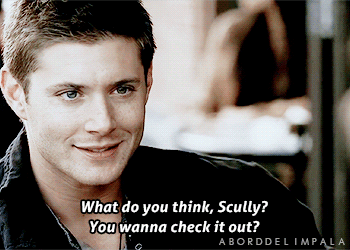
Regarding Mulder and Scully, this episode brought to mind episode 2x20 Humbug of The X-Files, an episode directed by Kim Manners (producer and director of Supernatural) which centred on a murdered ’Alligator Man’ from a travelling circus. Like this episode of Supernatural, that episode features a final fight in a funhouse.

Perhaps more interesting is a comment made by the owner of the circus who says that his dad used to own a travelling freak show, until freak shows were made illegal and the ’freaks’ were sent to asylums. I cannot be the only person whose mind went to 1x10 Asylum and the ghosts of Dr Ellicot’s torture victims. American Horror Story – Freak Show also came to mind, as well as the fact that one or two characters seen in the freak show were also in American Horror Story – Asylum which was set a decade or two after Freak Show.
Moving swiftly on, this episode also introduced the Harvelles. I did not especially care about them when I first watched the show, nor upon rewatch in 2015 (or re-rewatch in 2015), and I have to unfortunately say I still do not care too much about them in 2022, even after watching the whole show four or five times. The biggest reason is the fact that they are not in prominent roles, and barely appear after episode 2x06 No Exit. Kripke has admitted on various occasions that he only included the Harvelles because the producers wanted the brothers to have a fixed location as a base of operations, a bit like the library in Buffy. He resented their presence on the show and could not think of anything to do with them.
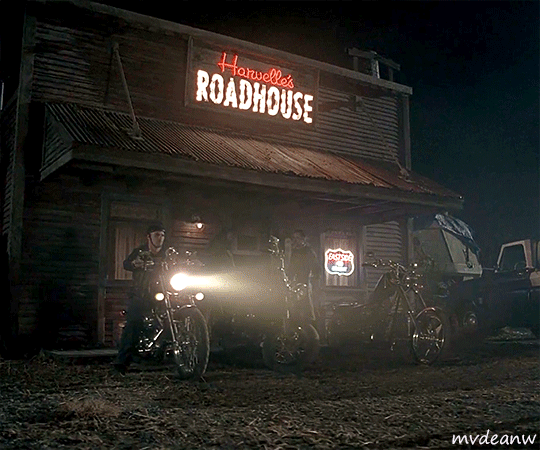
This is a shame. At this point in the story, Dean and Sam are very familiar to the viewer, and other ancillary characters have been undeveloped and scarce. John is dead, Meg is exorcised, and Bobby is yet to become a recurring character. While Dean and Jensen’s acting can more than carry this show, having extra characters makes the world bigger and more vibrant, even if the characters in question are not especially important or heavily-featured.
Guinan in Star Trek: The Next Generation has very little plot relevance (at least in the episodes I have seen so far). She could be cut from the story and very little would change, but she provides wit and sage advice, a respite for the crew and audience from the main drama, and adds another voice to the story. Likewise, Lorne in Angel had very little to do with Angel Investigations for quite a while, but his presence livened up the show and made it all the richer.

My point is that the characters do not need to be essential to the plot to be included as more than a side-note. For example, Ash and Dean clearly bounce off each other in a way that begs to be explored more, and I would love to see more of Ellen. Jo is presented (unsuccessfully) as a potential love interest for Dean (as is Ash, but much more subtly), but her sisterly chemistry with the boys could be developed to great effect. If all we have is the essential plot and infrequent side notes, we have melody but no chords or embellishment.
Unfortunately, Jo was not written well as a potential love interest for Dean, and some of the female fans hated Jo with Dean. Even Jensen has referred to this in an oblique manner. At a Jus in Bello convention panel, somebody asked him whether he could see Dean settling down with somebody at any point. His response was that ’If there were ever a huntress... you would all kill her.’
One of the problems I have with Jo is that she is not introduced in a positive light. Rather, she reminds me too much of a character who is supposed to be a Bad Ass Bitch, but who is actually a douchenozzle.
youtube
She clearly does not know how to use a gun properly as Dean points out, and because she has the barrel jammed into his back
Dean’s line ’Oh, please let that be a gun’ also raised question marks, especially given the show’s subtle hints that Dean was forced into something akin to prostitution, and the likelihood he was almost date-raped at one point when very much underage. It could have been simply a joke, but it makes one wonder what else Dean has had jammed into his back against his will.
I am so happy John is burning in Hell. Burn, motherfrakker, burn!
Of course, right after Dean disarms Jo, she punches him in the face, which is not surprising considering she made the assumption he was...what, an intruder? A murderer? A rapist? I have no idea, nobody ever says why Ellen and Jo were so suspicious. Dean and Sam hardly made a secret of their being in the Harvelles’ pub, nor were they acting shifty. Was this just more manufactured drama? Probably. Anyway, Jo smacks Dean in the face hard enough to hurt him, because a tiny slip of a girl can easily punch a tall man in the face hard enough to hurt and phase him like that. At least she can take a punch, though, showing the viewer that she actually is on an equal footing with the male characters around her. She punched Dean in the face, and he punched her right back.
Oh wait, no he did not. Why? What reason is there for Dean to not hit her back afterwards, especially considering she took the gun back (how?)? Is this a chivalrry thing? Is this because Jo’s a girl and boys cannot hit girls or something? Is that what this is? Because the only other reason I can think of is that the writer did not want Dean decking his potential love interest at first meeting? If he had done that, it would have reset her brain back to factory settings, but it would also have shown the viewer that not only can Jo punch like a man, she can also take a hit like a man and keep going, just like Meg.
But of course we cannot have women being treated as men’s equals on television. Sure we can have them disarming a 6”1’ squirrel whose life has revolved around fighting, but actually having them able to take a man’s punches would just be too too damn much. They are only girls after all, we cannot expect them to be able to take that kind of treatment.
So let us take a brief look at Big Sky.
youtube
The two lead characters Jenny and Cassie are both women, and neither of them is ever treated as less competent or dangerous than the men around them. They definitely not male characters in women’s bodies, but they can absolutely fire a gun, take a punch, and put their lives in danger to save others. They never do anything stupid (unlike Jo in 2x06 No Exit), and I am completely behind them as characters. The show does sort of have a problem with almost all of the bad guys being men and almost all the victims being women. Beau’s (Jensen’s character’s) old-fashioned assumptions about women not knowing cars and Jenny getting uppity when he called her ’darlin’ was a little on-the-nose and unrealistic, but it was not too distracting.
Anyway, speaking of ’on-the-nose’, Jo offers no apology for assaulting Dean based on false assumptions, but rather proceeds to look smug as he sits with an ice pack pressed against his head. Was I supposed to laugh at the ice pack? Was I supposed to think ’haha, big muscly man got hit by a girl’? And was I also supposed to think that Jo was strong, capable, and dangerous?

If it is funny that she hit him, then it cannot be true that she is strong, otherwise what is there to laugh about? It cannot be funny that she hurt Dean, otherwise her strength is undermined.
This is one of the oxymorons and contradictions I was very aware of growing up with a penis. Girls are super and can do anything boys can do. They can do it better, in fact, because boys are stupid and you should throw rocks at them. The girl power of the 1990s was all about female chauvinism, as I discussed in my essay about Max kicking Alec in Dark Angel. But at the same time, boys should not hit girls because boys are stronger than girls, and only gays and wife-beaters hit girls. So are girls on an equal footing with boys? Or are they delicate little flowers to be shielded and protected from us? Make your choice and stick with it.
Having grown up with five sisters, one of whom set fire to the girls’ toilets at secondary school, one of whom managed to piss on the floor while sitting on the toilet, and one who sometimes did not flush the toilet after menstruating, I have no illusions about them being precious, delicate flowers.
Taking a step away from the lavotory for a moment, why was this Dean-bashing in the episode following John’s death? Jo hits Dean, the carnies have fun at Dean’s expense (with Sam letting them do it), Sam’s a douche. Tell me Dean is supposed to be the sidekick character without telling me he was supposed to be the sidekick character. About half the new characters in this episode specifically target Dean for ’jokes’ and jibes, whereas none of this is aimed at Sam. The more I write these analyses, the less I feel inclined to apologise for hyperfocusing on Dean and giving Sam short shrift: the show treated Dean like something it stepped in, and I want to redress the balance.
Jo also tries hitting on Dean (a completely tactless move given his dad has only just died), but it comes across more as a ’I am so hot and everybody wants to get in my knickers’ brag than ’Sorry I hit you in the face, would you like me to give you a massage to relieve your tension?’ She seems boastful, especially her claim that every hunter who comes through the door tries to get into her knickers with beer, pizza, and Led Zeppelin. I think I can see what the writer of this episode (and the writers in general) were trying to do with Jo, but it did not work. She seemed more like a try-hard and an amateur than a competent hunter-in-training who would be a romantic match for Dean. She is more like a sister, and even Dean realises this quite early on in this episode. He says ’wrong time, wrong place’, but his heart does not seem to be in any of his flirtations. This is most probably a mix of acting out of habit, being recently bereaved, and there being nothing between them.

Apropos Led Zeppelin, if Dean tried beer, pizza, and Zep with me, we would be upside-down and halfway to Happyland within five minutes.
Please note also, Dear Reader, that Ellen said John ’was like family once’. Whatever could that mean? Well, John has one confirmed illigitimate child named Adam: is Jo John’s daughter and Dean and Sam’s half-sister? Perhaps.
As for Ash, if you stop assuming Dean is straight unless proven 100% otherwise, the interactions between him and Ash are unmistakably flirty. They compliment each other (calling Ash a Skynyrd roadie is a big compliment from Dean), Dean gives him flirt-face, and there is even a wink involved. Ash makes a reference to ‘being all over it like Divine on dog dookie’, this being a reference to drag queen Divine who ate dog poo in the gay cult film Pink Flamingos. Why would he make this reference if he was not sure Dean would get it?
youtube
Dean enters Harvelle’s Roadhouse and has both Jo and Ash wrapped around his finger in minutes. That kind of power should be illegal.
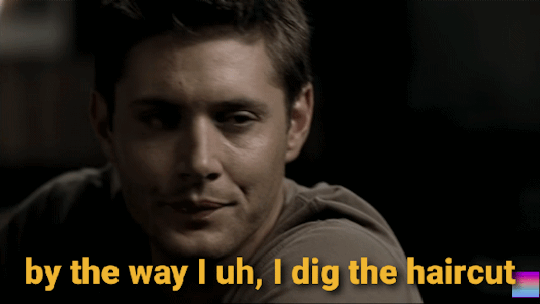
Moving on, John’s funeral pyre scene at the beginning of the episode shows how like chalk and cheese Dean and Sam are. Sam is more obvious with his bereavement, his tears flowing freely and his grief plain to see on his face (why did we have none of this after Jess died?). Dean, however, is stony, stoic silence. He will receive a lot of bother from Sam for this ’strong, silent’ act, but even knowing what John told him and where Dean goes in the next few episodes, neither brother’s reaction here seems out of the ordinary. Crying about your dad’s death is normal, as is not crying about it. Sam’s inability to understand other people’s grief does not negate that.
Apropos Sam’s inability to understand expressions of grief that are not obvious, this is the source of the conflict between him and Dean in this episode, and it is the thing which caused my detestation-induced tumescence to reach full-mast. Sam stans, gird your loins and come at me.
Dean reticence and Sam’s mainstream, easily-digested expression of grief contrast sharply. Sam is supposed to be the general viewer’s gateway into the Winchesters’ parallel world, and he is used as a tool by the writers to give information about Dean that Dean would not reveal of his own volition, e.g. that he loved Cassie in 1x13 Route 666.
This is all well and good from a Doyle (extra-textual) perspective, but from a Watson (from inside the story) perspective, Sam’s behaviour when trying to get Dean to talk about his feelings is controlling, manipulative and downright disrespectful. That it is also self-absorbed goes without saying. I understand John Shiban who wrote this episode wanted to draw attention to the fact Dean was not talking about his feelings, but what he accomplished is creating a character who behaves as though he wants to dictate how others should process their bereavement and grief.
According to Dean, Sam had been asking him repetitively whether or not he was alright to the point of pestering him. On the one hand, Sam was grieving too and likely needed to share it with Dean, but as far as we know, he did not do this. Had he sat down near Dean while Dean fixed the car and said something along the lines of ‘Can I just sit here, maybe talk sometimes if I need to? I don’t want to be alone’, things would have been very different. Had Dean’s response been a snarky comment (which it almost certainly would not have been if he could sense Sam was serious), then Sam would be justified in being pissy.
Perhaps this happened and the viewer never saw it, but what we did see was Sam not respecting that the person he was speaking to was an adult and had no obligation to behave in a way comfortable or convenient to Sam. Dean made it clear he did not want to talk, as is his prerogative. Had Sam backed down then, I would have less of a quarrel with him. He is, after all, very young to be burdened with bereavement, especially so soon after his possibly-pregnant girlfriend died, and he is permitted an ounce of stupidity. However, rather than giving his brother space, he (in true Sam fashion) escalated the situation by turning it into a shouting match. I was considering giving him some lenience, but in the blink of an eye he was a sanctimonious fishwife. I wanted to rip my ears off and ram them down his throat. Was this in the script or was it Jared’s acting choices? Either way, I want to speak to the manager.
Their first argument in the episode is understandable, and the conflict forgivable. They are both young and suffering an immense loss. Nobody in that situation is going to act rationally, sensibly, or indeed decently all the time. In times like that, the facade that life means something falls away, as do our pretences that anything we do matters, and we are left facing the indifference of the universe. It takes its toll to skirt that close to the void, so Sam’s irritating behaviour and Dean’s prickly but reasonable withdrawal are not to be held against them. Had Sam kept his mouth shut after Dean shut it for him at the beginning of the episode, I would not have much quarrel with Sam.
But not only did he refuse to let up, he once again escalated the situation halfway through the episode by outright demanding Dean process his loss in a way Sam believes is appropriate.
For those of you who have forgotten, this happens after Dean and Sam stake out the young family’s home and hilariously blast the rakshasa through the glass door with a rock salt round. They ditch the ‘soccer mom’ minivan in some trees somewhere and walk back to the Harvelles’ (which is apparently located in Nebraska, a whole two states away from Wisconsin). Whilst walking down a dirt road, Sam gets all misty eyed and cringey about ‘doing what Dad would have wanted’. Dean does not really respond to this, instead falling silent in what anybody with more empathy that a teaspoon could tell is a declaration that he does not want to talk about it.
youtube
Sam, of course, being the small yappy-type dog he is, yips and yaps at Dean for this. ‘Don’t go all maudlin on me, man.’
I am not a violent man, but there is just something about Sam’s behaviour which brings the violence to the fore. My response to Sam’s ’maudlin’ comment involved a certain curse word which one is not allowed to say in Canada. He is a yapping chihuahua who has not learnt that yapping at a German Shepherd is a sure way to get a giant paw in your face. I wish Dean had decked Sam in the middle of the road and left him in the dirt for that. Dean’s dad just died and Sam has the audacity to call him ’maudlin’ when Dean is the one keeping himself in check and not bringing John up all the time.
Far be it from me to bring gendered behaviour into these analyses, but I think one of the big issues here is that Sam does not understand how men tend to deal with emotions. He is far from being alone in this, as contrary to popular belief, many experiences and behaviours exclusive or most common among men are not portrayed as the norm or the default. I have had to learn a lot about men and men’s psychology as an adult because I plainly did not have any exposure to it in childhood. I am cissexual, but this is something my trans friend and I share: we had to learn this for ourselves because nobody taught us it. Perhaps because I had to learn this like a second language, I can recognise a lot in Dean which is typical of men, or rather masculine people (because man =/= masculine and masculine =/=man).
Dean insists on multiple occasions in this episode that he is ‘okay’, and many people take this to be a clear lie, or a man repressing his emotions, or a man not being able to understand or process his emotions. What I hear him say, though, is ‘I’m coping’, and that is a very different thing. Of course he is not ‘alright’ if by ‘alright’ one means he is not suffering immensely after the loss of one of the most important people in his life. He is (or believes he is) managing to keep his head above water.
There is, however, an aspect of pretending to be ‘okay’ because he does not want people to pry. This is nothing unusual, but is normal behaviour for men. It is a truism that women do not want to have sex before they are ready, otherwise they feel cheapened; likewise men do not want to talk about our emotions before we are ready, otherwise we feel cheapened. Even when we do talk, most people are not listening anyway, and some are looking for things they can use as weapons against us. It takes a lot for a man to trust a person enough to talk openly to him or her (or whatever variation thereupon takes your fancy), and do let us not forget that Sam has given Dean little reason to believe he can be trusted with Dean’s vulnerability.
Not only has Sam been physically aggressive without provocation (1x08 Bugs), shot at him twice without ever offering real apology (1x10 Asylum), and belittled Dean’s bereavement at Mary’s death (1x11 Scarecrow), but he acts like an overgrown teenager. Worse, he attacked Dean after Dean refused to share his grief with Sam, a sure-fire sign that Sam does not have Dean’s best interests at heart or in mind, but rather wants something for himself. He is not able to offer Dean the surety, calmness, and reliability he would need in order to allow himself to be vulnerable and confide in his brother, any more than I would lean on my teenage nephew for emotional support whilst newly orphaned.
Something which sprang to mind when thinking of Dean’s bereavement was Men’s Sheds, an international organisation which arranges spaces for men (usually exclusively men).
youtube
The point of this is to give mainly older and elderly men whose support network of friends and family is gone due to death, divorce, or whatever else a community of other men in similar positions a time and space to get together and work on DIY projects, fix cars, or just have a cup of tea and watch football with other men. It is usually specifically for men for the same reasons women have female-specific groups: straight, gay, bi, cis, and trans men can be more comfortable and communicate easier in single-sex company because they are around people who speak the same language as them and share the same experiences. Men’s Sheds are built around the idea that men talk shoulder to shoulder, not face to face. What this means is that men form bonds with other men by working on things with them, and eventually will start talking when sufficiently comfortable.
Crying is also something which comes harder to most men than it seems to for women. Our tear ducts are longer and wider, our tear glands smaller, and our bodies do not produce as much of the hormone which induces the crying reaction. The aforementioned trans friend was shocked at how much harder it was for him to cry once he had been on testosterone for a while. Trying to cry was like trying to defecate whilst constipated. I cry, but only once or twice a year, and when I do there are usually very few tears. Emotions have to be relieved elsewise.
Anger is one of the most common ways men relieve these emotions. People are scared of anger, particularly men’s anger, but anger is neither good nor bad: it just is. Anger is the body’s way of helping you focus and on finding a solution to a problem, using physical force if necessary. A solution to dealing with these negative emotions is finding something to focus energy on, such as gardening, building a model railway, fixing the roof, or fixing a car.
Fixing the car is exactly what Dean is doing as the episode proper begins. As he himself states:
DEAN
...You got any leads on where the demon is? Making heads or tails of any of Dad's research? Because I sure ain't. But you know, if we do finally find it - oh. No, wait, like you said. The Colt's gone. But I'm sure you've figured out another way to kill it. We've got nothing, Sam. Nothing, okay? So you know the only thing I can do? Is I can work on the car.

Doing something like this can make a person feel capable, needed, and strong enough to keep going. Jordan Peterson gives the example of a young man who lost his father; Jordan’s advice to the son was to be the strongest, most reliable person at his father’s funeral. In being a support for other people, the son felt needed and had something to focus on. This helped him more than any amount of crying or chick-flick moments, and this is – generally speaking – true of men. We do not really want to talk about our emotions for talking’s sake. We want to find ways to solve the problems our emotions are telling us we are having. Or, failing that, find a way to make us feel strong enough to shoulder our burden and carry on.
This accounts for part of the silent, stoic act Sam gets angry about. Dean does not want to fall apart under the weight of his grief: he wants to keep himself and his inner workings in check so he can either find a solution to his problems or find the strength to carry on. Add to this the fact Dean cannot rely on anybody to pick him back up if he falls apart – definitely not Sam – and it is reasonable and frankly admirable that Dean manages to screw his testicles on every morning and keep going at near full capacity. I will try to emulate his strength the day I have to carry my dad’s coffin to his grave.
Dean’s way of coping is a traditionally masculine way of managing difficult emotions: keep control and keep going. Being able to do this generally helps men many orders of magnitude more than talking, because it makes us feel strong. This is, however, officially pathologised in American psychiatric circles, and ideas of ‘toxic masculinity’ have been leaking out into the mainstream for years. If people spoke instead of ‘men and women’s poisonous expectations and demands of men’, then we would suddenly be on the same page. But I see nothing ‘poisonous’ or ‘toxic’ in Dean not falling apart and weeping like a helpless damsel who just needs the right man’s penis to solve all her problems. Rather, it is a different but equally valid way of doing things.
That said, everybody needs an environment in which talking, crying, and relying on others is possible, acceptable, and encouraged if needed and wanted. I speak from experience. Dean does not have this: he cannot rely on or trust Sam. It is all well and good saying ‘you need to talk’, but to whom can Dean talk to and trust to be able to cope with what he has to say?
Nobody.
In this very episode, Sam showed Dean clearly that he does not have his back when the carnies started making fun of him in front of Sam. I was supposed to laugh at this, but after Dean had just lost his father?!?! Frak you, Show. Frak you with something hard and sand-papery.
By the way, if you want funny, this is funny!
In my opinion, Dean’s method is much healthier than Sam’s manipulative grief-policing, at least in the short term. Sam displays no sympathy or understanding of Dean, and is clearly not in control of himself. He lacks control of himself to such a degree that he tries to control other people instead. Sometimes Sam appears to genuinely love and care for Dean, but too often he treats his older brother like an embarrassing irritation he wishes he could control.
That being said, Dean is clearly not okay, but nothing about his behaviour in this episodes is untoward or unusual for a man who has just come back from the dead and whose father has just died. We will have to wait until episode 2x03 Bloodlust and 2x04 Children Shouldn’t Play with Dead Things to see that there is more than ‘normal’ bereavement at play, and do let us not forget 2x09 Croatoan.
The episode ends with a scene where Sam almost apologises to Dean for being a rectal irrigation implement and admitting how much he is struggling with John’s death.
youtube
Were it not for his douchey behaviour earlier in the episode, I might have been willing to give him a pass after this, but I still have his screechy fishwife act ringing in my ears. Perhaps I sound as though I am taking this personally, but I have been in a situation like Dean where I was ‘okay’ but somebody kept pestering me to talk in spite of my clearly not wanting to. Said person then got angry at me, shouted at me, and bitched about me in front of other people, all because s/he would not leave me be and could not accept not being in control of me. I recognise a lot of poisonous behaviour and attitudes in Sam which I have dealt with in my real life, and I am not here for them.
Something else I recognised was Sam’s attempt at control at the end. He said ‘I’m not okay’, which would have been all well and good, but he had to finish it with a ‘But neither are you. That much I know.’ Good for you, Captain Obvious, you are Big Smart. Unfortunately what you lack is empathy and wisdom. It is hard enough keeping oneself together and carrying on, but having other people see right through that, prying and poking, makes the whole ordeal a bigger challenge. Letting people maintain their illusion of structural integrity is sometimes the wise choice.
At the end of the episode, Dean watches Sam leave, then smashes the window of a nearby car with a hammer. Once that seal is broken, it is impossible to turn back the tide, and Dean inflicts serious damage on the car he has spent so long repairing. Why exactly he does this is uncertain, but a combination of grief and anger is obvious. The car is a lot of things to Dean: it is his prized possession, his home, and a representation of the burden John placed on him. Paula R. Stiles notes also that he focuses his attention on smashing the boot where all the hunting implements are kept, suggesting anger and a host of other emotions relating to being forced into the hunting life. She also mentioned that he stared after Sam before smashing his car up, but this could just have been him making sure his brother was out of sight and earshot.
The closing shot of the episode is of the blank death-stare Jensen is so good at doing. Forgive the cliché, but the best word I can summon to mind to describe his expression is ‘empty’: he has too many thoughts in his mind for any of them to be coherent. He has lost all hope, and the burden of becoming a fratricide when his identity has been formed around protecting and providing for others is tearing him apart. He is also likely aware as early as this that John traded his life and the colt for Dean, and Dean has already been living with survivor’s guilt since 1x12 Faith. He believes he should suffer for others, but others are suffering for him, and he believes he will have to kill those he wanted to protect. He cannot express any of this in words, not even conceptualise it. so all that remains is a blank, thousand-mile stare.

Dean’s structural integrity is compromised, and the centre cannot hold. Watch it unravel over the course of series two. But before you go and forget everything you just read, I have enough gifs remaining to share this:
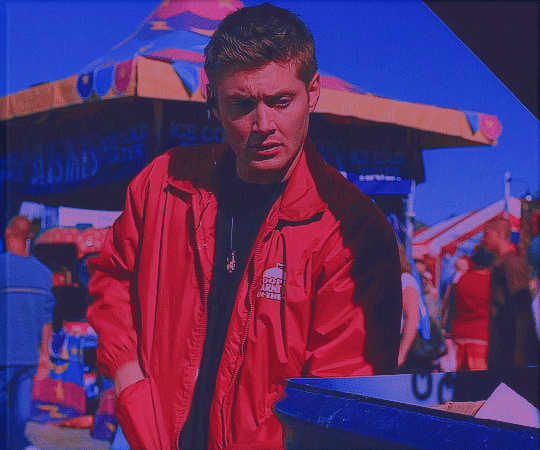
Look at his wee little outfit!
#Youtube#edvard's supernatural guide#spn meta#spn rewatch#spn 2x02#jo harvelle#dean winchester#supernatural#sam winchester#IT#stephen king#rakshasa#male psychology#s02e02#2x02 everybody loves a clown#dean is bi#bi!dean
17 notes
·
View notes
Text
Decoding the Male Psyche: Unveiling Hidden Truths About Boys
Decoding the Male Psyche: Unveiling Hidden Truths About Boys #MalePsychology #GenderStereotypes #EmotionalIntelligence #ToxicMasculinity #RelationshipCommunication
Unveiling the Mysteries: What Girls Don’t Know About Boys
Buckle up, ladies, because we’re about to embark on a journey through the enigmatic labyrinth of the male psyche. From the depths of locker room banter to the battlefield of dating disasters, there are certain truths about boys that remain shrouded in mystery to the fairer sex. But fear not, for I am here to peel back the layers of…

View On WordPress
#communication in relationships#Emotional Intelligence#Gender Stereotypes#Male Psychology#Toxic Masculinity
0 notes
Text
His Secret Obsession book by James Bauer Review

Hello, everyone! Today I want to talk about a product that is causing a buzz among women who want to understand the male mind and conquer true love: "His Secret Obsession".
The idea behind this product is to help women understand the secrets that men keep about their feelings and emotions, and to use this knowledge to strengthen the relationship and win the partner's devotion.
For those who don't know, "His Secret Obsession" is a digital book written by James Bauer, a relationship expert with over 12 years of experience. The book is divided into two parts: the first presents the secrets of male psychology, while the second shows how to apply these secrets to win the love and devotion of your partner.
Read more in my Blog: https://atmonayano.online/book-his-secret-obsession-by-james-bauer/
See you in there, tks.
#His Secret Obsession review#James Bauer#Male psychology#Understanding men#Relationship advice#Love and devotion#Building a strong emotional connection#Healthy relationship tips#Seduction techniques#Attracting the man of your dreams#Long-term relationship advice#Trust and mutual respect#Relationship expert#Digital books for women#Women's empowerment
0 notes
Text
That evening the men were practicing archery on the green. Bill Door had carefully ensured a local reputation as the worst bowman in the entire history of toxophily; it had never occurred to anyone that putting arrows through the hats of bystanders behind him must logically take a lot more skill than merely sending them through a quite large target a mere fifty yards away.
It was amazing how many friends you could make by being bad at things, provided you were bad enough to be funny.
Terry Pratchett, Reaper Man
#bill door#DEATH#reaper man#discworld#terry pratchett#fitting in#making friends#male friendship#reputation#pretend#undercover#psychology#group dynamics#skill#archery#logically#bad enough to be funny#amazing
2K notes
·
View notes
Text

Yesterday, saw this on a friend's insta story.
Seeing a guy identifying, recognising, realising this crucial piece and sharing it to help other people to recognise/remind this, was appreciable.
Especially when men in our society are conditioned to toughen up, not be sensitive; considered weak if he gets sad, emotional & cry; looked down upon if he shares his pain or asks for help/support. So when there is a strong emotion, you tend to deny it, distract yourself, you hide out, go into a cave, run away from it or when there is no where to go, a free, safe space to express, you supress, you bottle up for the fear of being judged. (This is why heartattacks percentage is more in men). Also It is a damn lonely place to be in- to keep your unmet psychological & emotional needs to yourself, inorder to show/prove that you are tough, strong to the society.
This needs to be addressed.
Irrespective of the societal conditioning, the first step here is this gem of a piece, 'Identify, acknowledge, accept & reflect your emotions' Neither invalidate them yourself nor let anyone invalidate yours. Each and every emotion is telling you something positive or negative if you observe closely. if its a positive emotion- to feel grateful for the conditions, situations, people who trigger such emotions & not to take them for granted; if its a negative emotion- something's isn't right, needs to be addressed, to take proper measures to change your perception or the situations, people who trigger such emotions in you.
No good happens when you deny, distract and run away from yourself, from your own feelings to avoid the pain. Then it becomes a constant battle inside which disturbs your peace of mind. Not only that, It also affects the way you see other people's emotions, and thus disturbing the relationships you have with people around.
Being able to be vulnerable or show vulnerability isn't a weakness, it's a sign of strength, that shows you overcame the fear of being judged, criticized. You are being true to yourself. You are being just human. You are willing to take risk and are not fearing to face the consequences of it. That simply shows your courage.
All you need is a Safe space to open up. Let go of the fear, Few people are willing to be that safe space for you.
Note/Disclaimer:
• This is applicable to everyone, not just men, but as i noticed, this running away, denying attitude is more common in men than women.
• I am not generalising anything here, how people process emotions is highly individual. These are my observations alone, based on my own experiences.
0 notes
Text
Why Looks Don't Matter (Unless They Matter to You)
Writing as a straight man, I can tell you that I can be attracted to women of any hair color, any facial features, any body type. If women enjoy dolling themselves up for various aesthetics, that's all good, but for instance, I do not think there is a straight guy here (or anywhere) who would not find every one of these pics attractive:






They are dissimilar in appearance and in style, but they all attract guys. Why? Because, acting or not, they all look "thirsty" for the camera, and thus, in a guy's (or non-straight girl's) imagination, for him.
We want a woman to want us, physically and otherwise. We prefer any woman who genuinely wants our body and mind over a "hot" woman who is bored with us.
The lesson: Look however you want to look, but if you find a man you want (make sure he's the right guy, though), look at him with desire for him, and he will find you attractive for that. Take notes from these celebrities, as they know how to attract the opposite sex (or, with at least two of them, the same sex as well).
What we want is for you to love us, intimately and otherwise (including friendship), even if we might look like this...

Or like this (for instance)...

#body positive#what men want#male psychology#how to get a man#thirsty#love his body#Barbie Ferreira#Emma Roberts#Chloe Bailey#Julia Vins#Margot Robbie#Kristen Stewart#Sol Goss#photography#fashion#hair#beauty#male body positivity
2 notes
·
View notes
Text
#health & fitness#qigong#spiritualhealing#meditation#mindbodysoul#podcast men#male psychology#mentalheathawareness#stress management
1 note
·
View note
Text




I can't resist, it's quite beyond me. He's babygirl and husband material at the same time, he is so perfect 😩
#mushroomoasis#mushroom oasis#mushroom oasis vn#mushroom oasis mychael#murdersim#murder sim#yandere sim#male yandere#yandere#visual novel#game#horror date sim#horror dating sim#horror romance#psychological horror#horror dating
269 notes
·
View notes
Text
Brat tamer implies that they turn into good, obedient little pets out of their own motivation and re-discovered will to please, but brat breaker shows that they just need to be fucked up, physically and mentally, so blissfully thoroughly that their brain starts lacking the capability to continue bratting, even if they tried to.
Now - at the brat reading this - I know you have a favorite among the two of these, and it's pretty fucking embarrassing how easy it is to guess which. What does that reveal about your disgusting self and your inherent need to challenge authority, mh? Exactly - you just so desperately need someone to not give you a choice, but instead take what they want, how they want it and turn you into what they want you to be, with little to no concern for you.
You're not half as complicated as you pride yourself on being.
#my own#gender neutral post#female sub#male sub#nb sub#trans sub#degradation.#cnc.#bratting.#brat taming.#manipulation.#psychological domming.#< my fav tag returns hehe
201 notes
·
View notes
